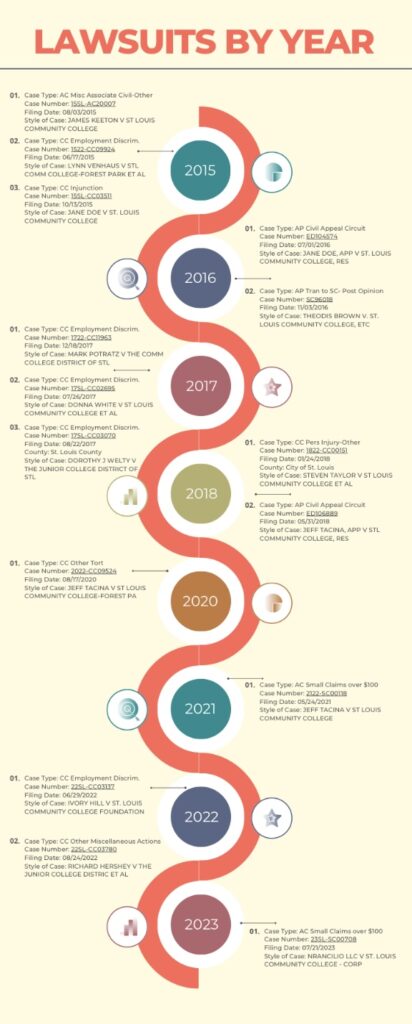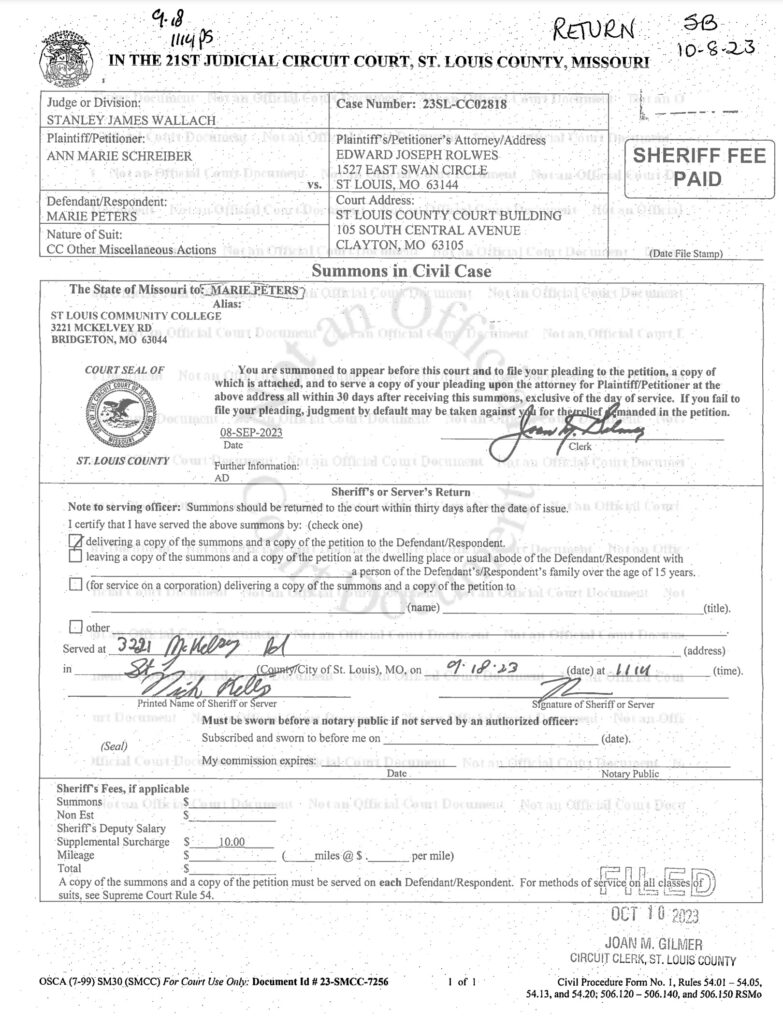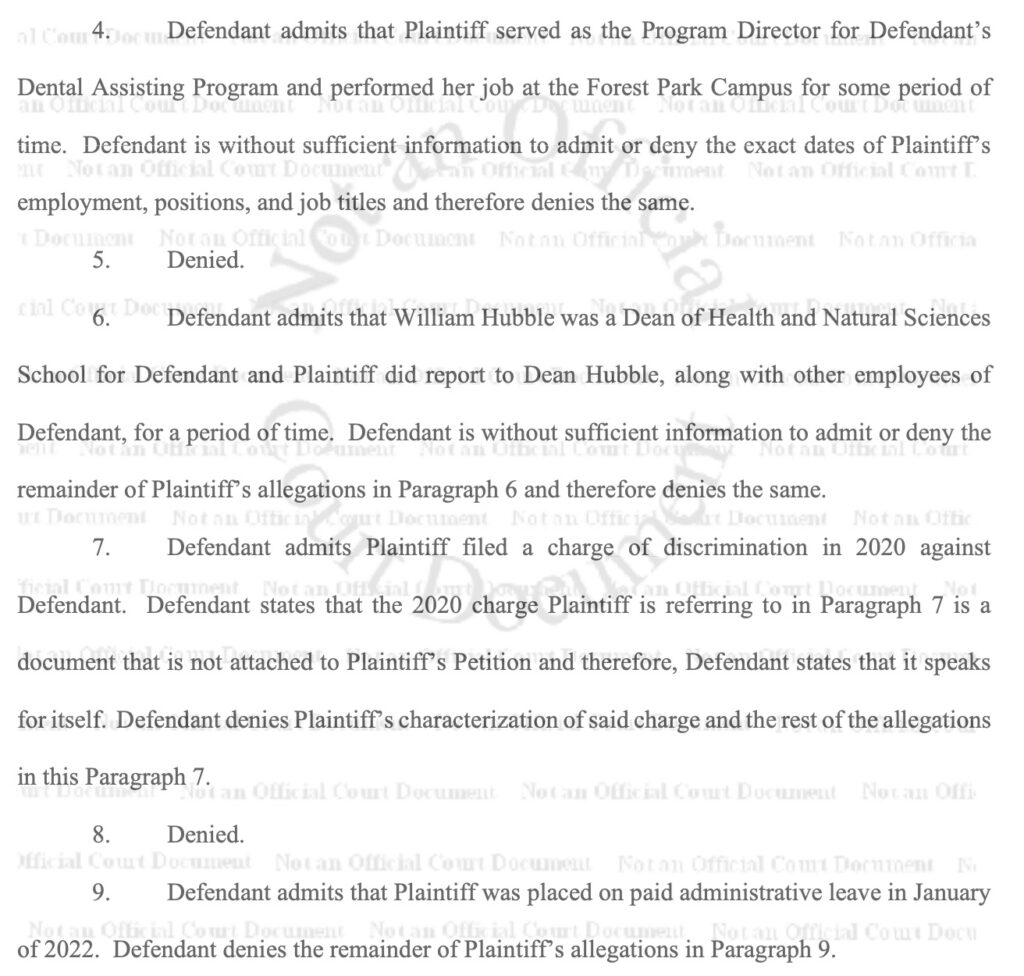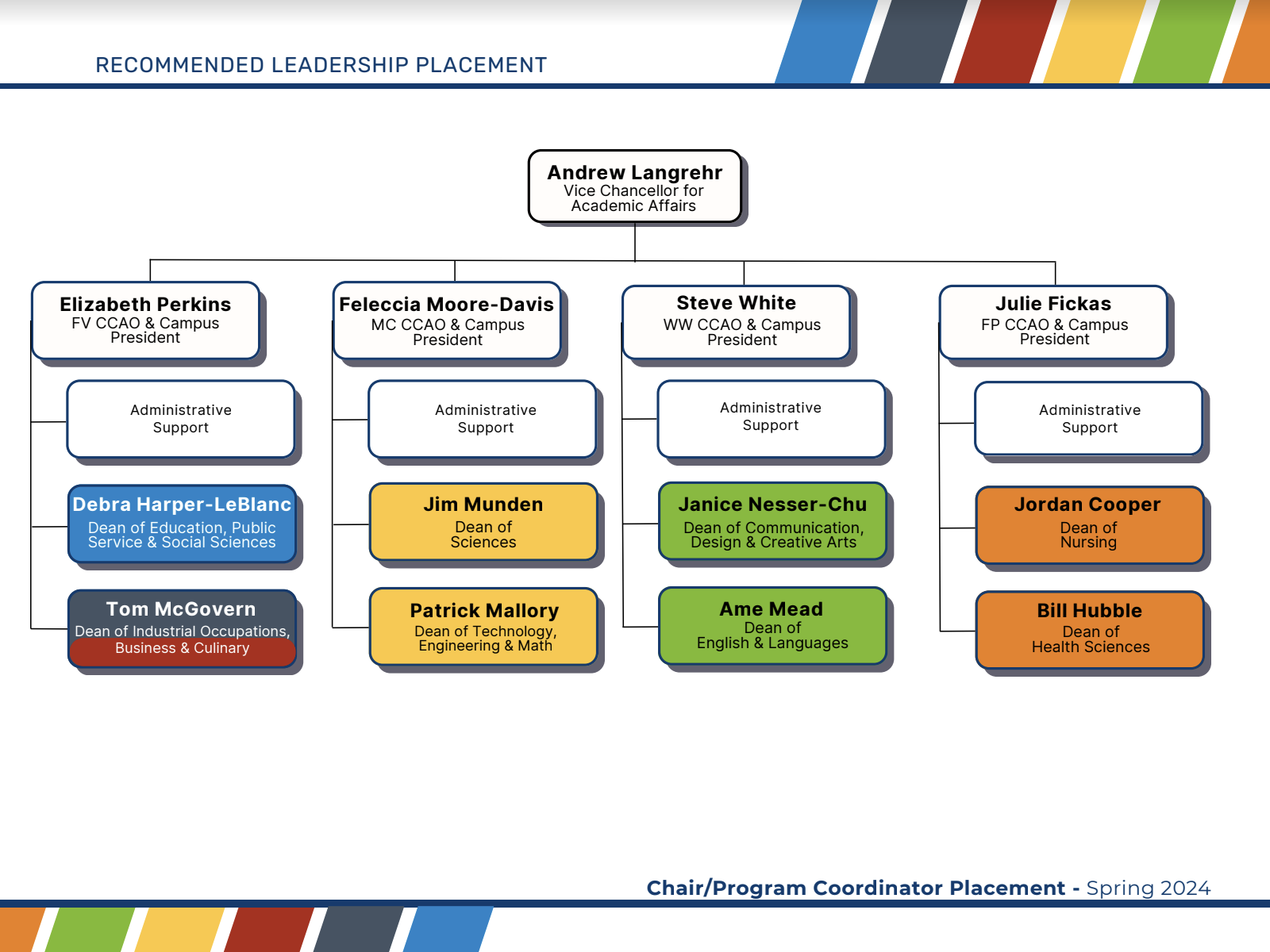STLCC’s General Counsel offers insight into who is suing the college and why
BY: JACOB POLITTE
Managing Editor
Editor’s Note: This piece is an extended version of the lead story in the March 2024 print issue. That print piece was slightly condensed due to space constraints. This version features more quotes from STLCC’s new General Counsel Amy Clendennen and some additional clarifications regarding the highlighted cases, as well as a breaking news update on the Bush-Munson case.
Over the years, St. Louis Community College has been involved in an extensive history of litigation, including multitudes of cases in recent years concerning employee discrimination and intimidation, personal injuries and other matters. Two recent cases involved those who were former long-time college employees.
Clendennen replaces Singer
Over the course of researching the matter, The Montage was informed that the college has a new General Counsel. Amy Clendennen joined the college in mid-January following the departure of Lucy Singer; she most recently worked as the General Counsel for Truman State University, her alma mater. Prior to that, she worked for close to 15 years in private practice, including 13 years working at Tueth, Keeney, Cooper, Mohan & Jackstadt, P.C.
“They represent primarily K-12 school districts and higher education institutions,” Clendennen said. “So I’ve been in education law pretty much my whole career. My family are all public school educators. So public education is a passion of mine.”
Clendennen said that while she enjoyed working at Truman State, family ties brought her back to the St. Louis area.
“[Working at Truman State] was a great experience. Great people up there. But to be honest with you, I have 24 year old twins who live here in St. Louis,” she said. “And, you know, I lived here for most of my adult life, and I just missed being closer to family, and friends. So that’s why I came back. And then I found out that Lucy was leaving and talked to her a little bit about the job and decided to submit an application and here I am.”
Clendennen is not sure why Singer left the college, and was hired after Singer had already left.
“I know Lucy a little bit, just because we both worked in Higher-Ed. And so I know her, I’m friendly with her. And I did speak to her when I found out that she was leaving. But when I was hired for the position, she’d already been gone for some time,” she said. “So we did not have a transition over of the work of the ongoing workload. More of a personal transition, not a professional transition.”
Clendennen says her role as General Counsel for STLCC may have some different responsibilities than her role at Truman was, but spoke to what she has done in the past and what she expects to do in her new role.
“Aside from the litigation, I review a lot of contracts. I work with HR closely on any type of personnel issues [and] potential conflicts,” she said. “I work with Student Services, if there’s an issue of student has a concern or complaint that might potentially lead to litigation, a lot of what I do and why any university or college would have a general counsel, or an attorney in house is to try to prevent litigation from happening to try to solve problems before they occur.”
She continued, “And so I tend to be pretty conservative in my advice, and I tend to say ‘how can we fix this potential problem before it gets worse?’ So that tends to be my strategy. [It] doesn’t always work, but I do what I can.”
A prelude to the cases
The Montage reached out to all parties involved or named in the court documents. The only person to respond to a request for comment was Chancellor Jeff Pittman, who declined to speak on the cases other than to reiterate that “College staff cannot comment on personnel issues or pending litigation.”
The two plaintiffs in these cases were long time employees of the college, a fact that Clendennen speculates is not something the college dwells on.
“The college has so many employees and you’re talking about two out of the thousands of employees only to or have a problem, that’s not so bad,” she said. “And also […] I’ve experienced just meeting people here since I’ve started […] the administration is all really pretty new. So my hope is that if there were problems in the past, that one of the reasons we have a new administration, or one of the things that they were focused on is making sure not to repeat past mistakes.”
Clendennen also said she doesn’t think that the amount of litigation the college is involved in is a cause for concern.
“I think every employer, every business is going to be involved in litigation, because the reality is, you know, I can review a situation,” she said. “I can give my approval that we’re doing everything right, go ahead and proceed. And we can still get sued. Anybody can sue anybody for any reason. Now how far that goes, obviously, depends on the merits of what they’re claiming.”

The college has hired outside legal representation for many of its cases, including the two being discussed on the following pages. Clendennen says this is a normal practice.
“I have a background in litigation, and I frankly enjoy it. But it’s just not possible to handle the litigation for the college and also do all of the other day-to-day stuff that I have to do,” she said. “So the college hires outside counsel from a variety of law firms to handle, you know, not just lawsuits, but if there are disputes that arise that may potentially lead to litigation. Or sometimes if it’s like even negotiating, or a real estate lease, things like that, we may hire outside counsel for that.”
Clendennen continued, “And then my role is really just to oversee the other lawyers who are working on those matters and make sure that they’re meeting deadlines, and that, you know, I personally like to review everything that they prepare to file. So that, you know, I know that it’s up to the quality that we expect.”
ANN M SCHREIBER V MARIE PETERS
This notable case names STLCC’s Chief Operating Officer Hart Nelson as a defendant, with former employee ANN MARIE SCHREIBER as the plaintiff, who is seeking damages from the college. The suit alleges that Schreiber, an STLCC employee since 2005 and the Coordinator for Disability Support Services (CDSS), was reprimanded by her immediate supervisor Marie Phillips for reporting various ADA violations to the Office of Civil Rights. The suit alleges that this disciplinary action was sanctioned by and under the directive of Nelson. Schreiber is looking to collect punitive damages from the defendants totaling either the amount of $250,000 or two times the amount of lost back pay, whichever is the higher at the time of judgment. She’s also requesting that her service credit history be recalculated, and reinstatement in a position with similar responsibility, wages, and benefits.
The suit reads, “Because of the unlawful conduct of Defendants as described herein, Petitioner has suffered loss of wages, lost employment benefits, diminution and loss of retirement benefits, emotional pain and suffering, and attorney’s fees and costs due to this litigation. The conduct of Defendants was willful and malicious, thus subjecting Defendants to punitive damages in an amount that will punish said Defendants, and deter others from similar conduct.”
The suit states that “Schreiber remained continuously employed by STLCC as its CDSS on a full-time basis at all times relevant to this Petition, a period of time in excess of 17-years without one disciplinary incident prior to the retaliatory conduct by STLCC directed against her outlined herein. As the CDSS at STLCC, Schreiber managed a 30-year long running project funded by an external agency that provided services legally required by the Americans with Disabilities Act.”
The suit then goes on to read, “Beginning in December 2021, and continuing through August 3, 2022, retaliatory actions were taken against Schreiber by STLCC through its agents and employees, including:
- Marie Peters, the Manager of Continuing Education at STLCC. Peters was named as Schreiber’s direct supervisor, and is claimed in the suit to have maliciously, willfully and intentionally retaliated against Schreiber for engaging in various Protected Activities, including contacting the Missouri Department of Elementary and Secondary Education (“DESE”) to express concerns regarding the exclusion of students with disabilities from the AEL program at STLCC on the basis of disability status. This information was first brought to Peters attention by Schreiber in December 2021, and in the suit, Schreiber claims she was told to immediately cease and desist from engaging in all communication regarding her concerns. Among other claims, the suit reads that Peters allegedly disciplined Schreiber for reporting ADA violations of STLCC, and later called campus police to have Schreiber removed from STLCC’s campus when she attempted to show up for work on July 8, 2022 with a valid employment contract for the 2023 fiscal year. Prior to this, Peters was also accused by Schreiber in the court documents to have verbally berated her during a March 25, 2022 disciplinary hearing, apparently concerned that Schreiber’s actions may have cost the college some funding from DESE.

- Hart Nelson, the Chief Operating Officer of STLCC, who is claimed in the suit to have maliciously, willfully, intentionally retaliated against Schreiber for engaging in the Protected Activities. He is claimed to have sanctioned the illegal disciplinary actions of Peters without cause or justification. He also allegedly refused to sign off on and submit STLCC’s application for third-party funding of its long-standing Disability Support Services program for the 2023 fiscal year which was the funding-source of Schreiber’s 17-year position of employment at STLCC in the Coordinator role. Later on in July 2022, he supposedly allowed all employees of STLCC who previously worked in Disability Support Services to resume employment at STLCC pursuant to direct funding by STLCC of their employment… except for Schreiber.
- The institution of STLCC itself, for both Peter’s and Nelson’s conduct and for failing and refusing to honor Schreiber’s STLCC-funded employment contract for FY-23 with the college. The latter was confirmed by an Aug. 2023 letter to Schreiber from Robin Phillips, formerly the Associate Vice Chancellor of Human Resources at STLCC, and now the Vice President of Human Resources and Co-Chief Diversity Officer at California State University in San Bernardino. The institution is accused of failing and refusing to allow Schreiber to enter and remain at STLCC’s offices to perform her job duties under her valid STLCC-funded employment contract, and failing and refusing, through the filing of this Petition, to pay Schreiber amounts due to her pursuant to the legally binding STLCC-funded employment contract for the 2023 fiscal year.
It’s worth noting that while the long-departed Phillips is listed as a defendant in the case, Clendennen, at the time of the interview, was not entirely sure that Schreiber’s team can bring this case against her.
“The issue is when does a court have jurisdiction over a person, and when they don’t live in the states, then you’ve got to find another way to get them into this state,” she said. “And I have no idea what this person’s situation is. I’m taking your word that she lives in California, but let’s say she does, then it could be a problem unless she’s done something to consent to jurisdiction and the Missouri court, then the plaintiff may have a problem actually bringing this case against her. And that’s because, you know, jurisdiction really stops at state lines, unless [for example] when you do business in another state, then you’re consenting to jurisdiction in that state. And there are some other exceptions, but there may not be personal jurisdiction in this case.”
Despite this, Phillips appears to be represented by a Kirkwood attorney, Jason Scott Retter. Retter is also representing Nelson, Peters, and the college. Schreiber is being represented by Edward Joseph Rolwes, an attorney for the Rolwes Law Firm.
The suit says, “STLCC demonstrated an ongoing, persistent, and institutionalized pattern of retaliation against Schreiber after each Protected Activity.”
Specifically, the suit lays out a detailed timeline of events, that can be viewed on pages 4-7 of the document. Other court documents and information on the case can be found on the cases’s CaseNet page.
DEBORAH BUSH-MUNSON V THE JUNIOR COLLEGE DISTRICT
Former longtime Forest Park Professor Deborah Bush-Munson is suing the college for damages over what she claims is racial discrimination. While the college is the only named defendant, it appears that Chancellor Pittman was served with the suit at a Forest Park address; he does not appear to be a defendant as of the most recent filing. As of press time, the matter is set to go to trial in early June 2024. Bush-Munson is represented by Jonathan Charles Berns, while the college is represented by Timothy John Reichardt and Kyle Christopher Westbrook.
In the suit, Bush-Munson claims that as a result of the college’s conduct and actions, she has suffered lost wages and benefits of employment and will continue to suffer lost wages and benefits in the future. She also says that she has suffered emotional distress and mental anguish.
Bush-Munson was a professor for several years at the Forest Park campus before beginning her role as the Program Director for the Dental Assisting Program in 2011, a role that she apparently served in for over a decade before being placed on administrative leave on in January 2022, and her official removal from the role on Feb. 14 of that year. Her final year at the college was, according to her, demeaning and damaging to her reputation.
According to the suit, upon William Hubble’s arrival as District Dean of Science in 2018, Bush-Munson directly reported to Hubble. The following then occurred:
- Two years later in 2020, Bush-Munson filed a charge of discrimination with the Equal Employment Opportunity Commission (“EEOC”) and the City of St. Louis Civil Rights Enforcement Agency (“CREA”), alleging that the college and Dean Hubble discriminated against her on the basis of her race.
- A year later in 2021, Dean Hubble allegedly told Bush-Munson and others that he was angry and upset at her over the EEOC charge.
- Five months later in January 2022, Bush-Munson was placed on administrative leave for the Spring 2022 semester. The college’s stated reason for the decision was that students had made complaints about her. In the filing, Bush-Munson said that she believes that this stated reason was pretextual, and later determined that the complaints had no merit.
- At the same time, the college reportedly made the decision to discontinue the Dental Assistance Program, where she was still the program director.
- On Feb. 11, 2022, Bush-Munson filed another charge of discrimination based on race and retaliation with the EEOC and CREA, alleging that the college discriminated and retaliated against her by placing her on administrative leave. In addition to the filing of the charges of discrimination, she complained of discrimination and/or retaliation internally at STLCC. She claims that the college did not take adequate steps to respond to her complaints. Throughout the remainder of the year, Hubble is claimed by Bush-Munson to have repeatedly harassed her by making inappropriate demands for her to provide him information that he did not legitimately need and/or had already been provided.
- Throughout the remainder of the year, and into 2023, Bush-Munson repeatedly expressed interest in, or applied for, other teaching positions at the college; there were open positions for teaching Biology courses or in Biology, jobs that she was qualified to and experienced in teaching. In the suit, Bush-Munson claims that the college repeatedly refused to select her for those open positions.
- In September 2022, the college informed Bush-Munson that they had decided not to renew her contract set to expire in May 2023, effectively terminating her from the college. They also reportedly denied her requests for a transfer or teaching assignments for the remainder of the year, instead assigning her menial tasks or no tasks at all. The suit states “The assignment of such tasks or no tasks at all was demeaning and diminished her professional stature with her colleagues in the College and in her profession.” In addition, the suit alleges that when the college deactivated other programs which had non-Black program directors and/or program directors who had not complained about discrimination, they allowed such other program director(s) to transfer to a different position while refusing her requests.
- Bush-Munson made another charge of discrimination with the EEOC and the Missouri Commission on Human Rights (“MCHR”) alleging race discrimination and retaliation on Jan. 31, 2023.
Bush-Munson’s suit claims that her race and her complaints and charges of discrimination were deciding factors in the college’s decision to effectively terminate her employment.

In a response document to Bush-Munson’s suit, among other denials, the college refused to confirm Munson’s exact time of employment, a strategy Clendennen hypothetically discussed.
“I truly don’t know anything about the length of time Ms. Bush-Munson was employed,” she said. “But I can tell you, hypothetically, or in theory, why an attorney would do that. And it’s because they’re only responding to what is in the petition. […] So, if you don’t know, for sure you deny it. So it may be one of those things where our records aren’t entirely clear there. You know, it’s really a technicality.”
Bush-Munson claims in the petition that she had been employed with the college since 2007.
Hubble is not directly named as a defendant in this case, despite being mentioned several times in the suit.
Specifically, the suit lays out a detailed timeline of events, that can be viewed by viewing the case’s CaseNet page.
In an update that occurred just after this issue was sent to press, it appears that a hearing in the case has been scheduled at the Carnahan Courthouse for Wednesday, March 20 at 9:00am.
Stay tuned to future issues, and to meramecmontage.com for further updates on these stories.












